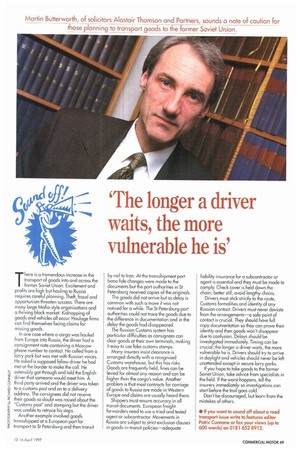The longer a driver waits, the more vulnerable he is'
Page 51

If you've noticed an error in this article please click here to report it so we can fix it.
There is a tremendous increase in the transport of goods into and across the former Soviet Union. Excitement and profits are high but hauling to Russia requires careful planning. Theft, fraud and opportunism threaten success. There are many large Mafia-style organisations and a thriving black market. Kidnapping of goods and vehicles all occur. Haulage firms can find themselves facing claims for missing goods.
In one case where a cargo was hauled from Europe into Russia, the driver had a consignment note containing a Moscow phone number to contact. He called from a lorry park but was met with Russian voices. He asked a supposed fellow driver he had met at the border to make the call. He ostensibly got through and told the English driver that someone would meet him. A third party arrived and the driver was taken to a customs post and on to a delivery address. The consignees did not receive their goods so doubt was raised about the "Customs post" and stamping but the driver was unable to retrace his steps. Another example involved goods transshipped at a European port for transport to St Petersburg and then transit
I
by rail to Iran. At the transshipment port bona fide changes were made to the documents but the port authorities in St Petersburg received copies of the originals. The goods did not arrive but as delay is common with such a move it was not noticed for a while. The St Petersburg port authorities could not trace the goods due to the difference in documentation and in the delay the goods had disappeared. The Russian Customs system has particular difficulties as consignees can clear goods at their own terminals, making it easy to use fake customs stamps. Many insurers insist clearance is arranged directly with a recognised Customs warehouse, but this has risks. Goods are frequently held, fines can be levied for almost any reason and can be higher than the cargo's value. Another problem is that most contracts for carriage of goods to Russia are made in Western Europe and claims are usually heard there. Shippers must ensure accuracy in all transit documents. European freight forwarders need to use a tried and tested agent or subcontractor. Movements in Russia are subject to strict exclusion clauses in goods-in-transit policies—adequate liability insurance for a subcontractor or agent is essential and they must be made to comply. Check cover is held down the chain; better still, avoid lengthy chains. Drivers must stick strictly to the route, Customs formalities and identity of any Russian contact, Drivers must never deviate from the arrangements—a safe point of contact is crucial. They should have full copy documentation so they can prove their identity and then goods won't disappear due to confusion. Delays should be investigated immediately. Timing can be crucial; the longer a driver waits, the more vulnerable he is. Drivers should try to arrive in daylight and vehicles should never be left unattended except in secure lorry parks. If you hope to take goods to the former Soviet Union, take advice from specialists in the field. If the worst happens, tell the insurers immediately so investigations can start before the trail goes cold.
Don't be discouraged, but learn from the mistakes of others.












































































































